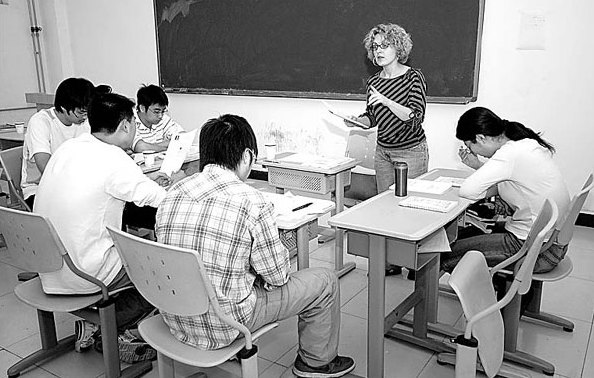They were subjects she studied in college more than 10 years ago, but for Mari Carmen Espn from Spain, Chinese - both language and culture -is very much a part of her life.
"In the past years, I have accomplished much in both study and work, and I enjoy a comfortable life in China with my husband," she says. "In return, I would like to bring something new to teaching of language education in our two countries, and help more students learn Chinese."
The 38-year-old blonde speaks fluent Chinese now, compared to the days when she first entered university in 1994. Many of her classmates chose to major in European languages, but she chose to study Chinese.
"I knew the language would not be easy to learn, let alone the completely different culture, but I took the challenge."
 |
| Mari Carmen Espin is a fervent advocate of Chinese language and culture, and she says she wants to promote better exchange between her native Spain and China. Provided to China Daily |
Actually, coming into contact with Chinese culture only spurred her interest and she decided to further her study another two years and got a graduate degree in Universidad Autnoma de Barcelona of Spain, in Barcelona.
As Espin journeyed further into Chinese and its five-thousand-year culture, she became more and more determined to experience real life in China. In 2001, she made the move.
"I wanted to improve my Chinese, especially in speaking and listening, and in learning more about the ancient culture," she says. She had told her boy friend, now her husband, that she would stay only one year, but it was a promise she failed to keep.
After seven years, she coaxed her husband over to China as well, and she next got a job as a French teacher in Shijiazhuang, capital city of Hebei province. Her next move was to the College of International Culture Exchange, Hebei Normal University, a post she has held since 2007.
"Initially, there were many cultural differences that surfaced during teaching, and I didn't know how to interact with the students," she says. Some of her students had laughed at her pronunciation mistakes.
"I was not discouraged, because it meant that they should not be afraid of making the wrong pronunciations, since their teacher made mistakes as well," she says.
Espin is now totally immerse in Chinese traditions, both in work and daily life.
She practices calligraphy because "I can feel the inner peace and long history through the slow tracing of Chinese characters",
